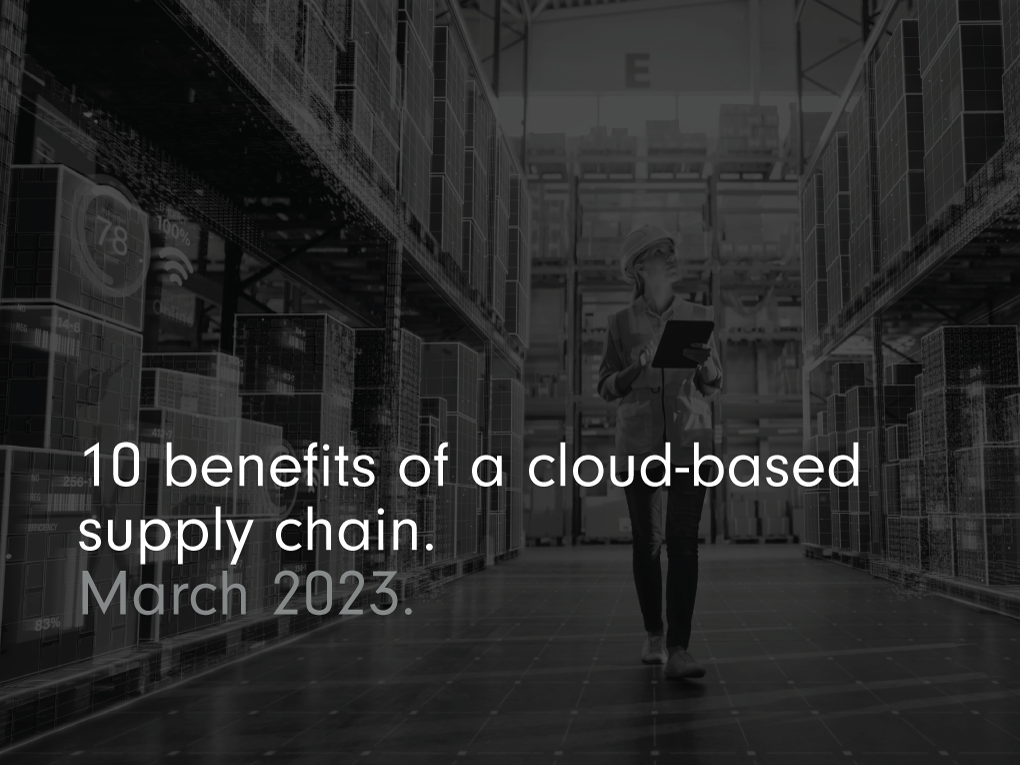10 benefits of a cloud-based supply chain.

As supply chains become more globalised and complex, there is a growing risk of disruption to the supply chain. This presents a challenge for distribution businesses who must be able to successfully overcome delays, bottlenecks and other frustrations that arise. Effective supply chain management is therefore critical to the success of any company. It can mean the difference between thriving in a competitive market or being left behind.
Traditional on-premise supply chain management software has its limitations, including high costs and limited flexibility. Fortunately, the cloud has transformed how companies store, access and share business data. And cloud-based supply chain software is revolutionising the distribution industry.
Leveraging cloud services can help you streamline your supply chain operations and enhance your overall business performance.
Here are 10 benefits of a cloud-based supply chain that can help you drive growth and success for your company.
1. Cost-effectiveness.

Cloud-based software is less expensive than on-premises solutions. That’s because you don’t need any infrastructure or services to support it. You won’t need expensive servers, air-conditioned server rooms or employees to maintain and support your systems.
So, there’s no large capital investment upfront and your ongoing operating costs are reduced too. It’s faster to implement cloud services too, which reduces your costs for the initial implementation and set-up.
Of course you still need to pay – for licence or subscription fees – but cloud SaaS solutions cost less, so you also see a faster return on your investment.
2. Accessibility.

An important benefit of cloud computing is that you can access your data from anywhere. This supports the practice of hybrid and home-working.
With cloud-based supply chain software, there’s no need to specially configure computers or other expensive equipment. And there’s no requirement for staff to store data or software programmes locally on their computers.
Anyone involved in your supply chain business can access the software remotely, with only an internet-connected device and a web browser. This means that your staff from finance, purchasing, warehousing, sales, marketing and operations can all easily access dashboards, customer and order data, and financial reports. With convenient access to data, your staff can still be productive, no matter where they are.
3. Scalability.

Cloud computing offers a great deal of flexibility for businesses, operating on a usage-based model. So, you can adjust your computing resources to fit your needs and budget, easily scaling up or down.
Once implemented, you only pay for what you need, so you can add licences for any additional staff as you grow, for example.
Cloud companies can rapidly respond to any new requirements, swiftly modifying their provision and enabling you to expand and scale your supply chain business.
4. Security.

Some companies keep their software on-premises because of concerns about data security. They worry that they will suffer a data breach or lose vital data, so they prefer to maintain control over it themselves.
But cloud-based supply chain solutions have proved to be remarkably secure. Suppliers are measured on their security and their reputations depend on having advanced features that protect their customers’ data. Your information is stored securely and access to it is tightly controlled via user authentication and your data is encrypted and backed up.
In the event of an accidental deletion or some kind of natural disaster that affects your own systems, disaster recovery protocols can be easily enabled, ensuring you quickly revert to your previous state, with minimal disruption and downtime.
5. Collaboration.

Using cloud-based supply chain software facilitates enhanced collaboration by streamlining communication and data sharing. By leveraging cloud technologies, supply chain data can be efficiently disseminated across all your locations and with third parties like suppliers, partners and customers.
Through automation, cloud solutions simplify communication and information sharing, which streamlines processes and enables greater transparency and faster decision-making in the supply chain.
6. Integration.

Cloud-based supply chain applications can be integrated more easily and more effectively. You can, of course, integrate and manage multiple on-premises solutions. But with such a set-up, you run the risk of encountering compatibility issues, data inconsistencies and inefficient workflows.
In contrast, cloud-based supply chain software eliminates these risks and consolidates all your supply chain operations. Using APIs and electronic data interchange (EDI), you can exchange data and documents more accurately and quickly. The result is a more streamlined, unified system that helps you achieve greater efficiency and agility.
7. Automatic updates.

With the cloud, your software is always automatically up to date. There’s no need to power down your business to update systems or fix bugs.
Cloud software is always being improved and updated in the background. The providers will specify their product roadmaps, giving you timelines for updates and improvements. If there are any issues, patches and fixes are deployed behind the scenes without affecting your uptime or access to your software and data.
8. Reliability.

If any part of your on-premises supply chain technology malfunctions, it needs to be fixed. But downtime is costly.
Providers of cloud supply chain software systems have high uptimes. They invest in their own infrastructure in order to provide guaranteed availability and reliability. Cloud technology runs on enterprise-level shared services with robust infrastructure redundancy to deliver extremely high levels of service availability.
You can check the average uptimes for most cloud-based supply chain software providers to see the average availability of their services.
9. Visibility.

With cloud solutions, your data is updated in real time. This increases visibility across your organisation. Staff have access to live data on all manner of financial and operational information, including stock levels, revenue and KPIs, for example.
With enhanced data analysis, your company’s board and management team can make more informed decisions, with instant access to the latest data, without having to wait for it to be synced or updated.
Additionally, as the cloud facilitates the sharing of your data, it is easier to collaborate with partners, suppliers and customers. This increases visibility and transparency across your supply chain, helping to work together and get goods to customers more quickly and more profitably.
10. Supply chain resilience.

With better visibility, reliability, security and collaboration with supply chain partners, you can build a stronger, more resilient supply chain. You can predict market changes, identify both opportunities and weaknesses more quickly, and build plans that will mitigate risks.
With connection to manufacturers, suppliers, logistics providers and customers, the cloud-based supply chain connects all parties and their data, engendering supply chain resilience, which ultimately gives you greater competitive advantage.
Call us today on 020 8819 9071 or get in touch to find out how switching to a cloud-based supply chain can be a smart move for your business.